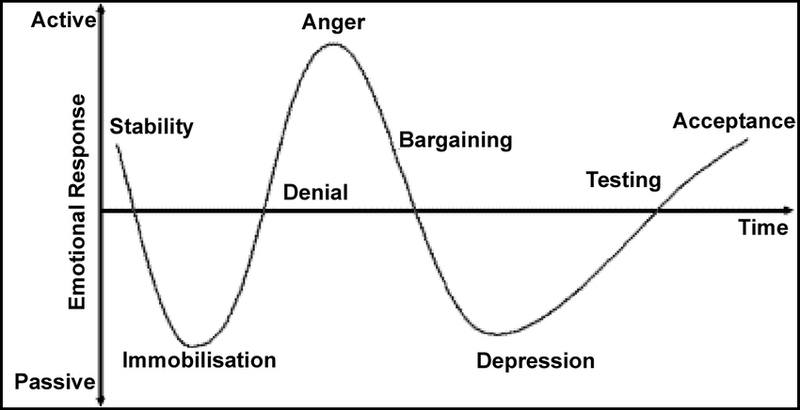
How do you deal with change?

At the moment we are all in a major change process, to which each responds in his or her own way. Yet all of these responses show a similar pattern. What stage are you currently at?
Because of the corona crisis, I was initially in denial, but I have shifted towards focusing on the new opportunities that this time offers. In order to do that, I had to go through all of the emotions that come with a change process. Psychologist Elisabeth Kübler-Ross outlines all of these different phases in the model named after her. She originally designed it for the grieving process, but it is also very useful for describing the change process. The stages of change are as follows:
Denial
In the first instance there is often denial. "It will not last" is what you might think, although you do know that this is not the case. If you want to change this and get others to join in, sketch a clear picture of what is to come and repeat it several times. And make sure you also understand why the change is necessary, so that you can explain this to others.
Anger
After realizing that the change is really going to happen, you often see the first emotional reactions. You may feel angry because you disagree with the change. This can lead to victim behavior or blaming others. Instead of being afraid of this anger, the best thing to do is give that anger space and find an outlet for it. Sooner or later it will get out anyway.
Negotiating
After the anger you slowly start thinking about how to make the best of it. Some use that thinking space to try to get out of the change, but others try to steer the change in the direction that is most favorable to them. Weigh your choices and discuss them with others. In this way you will get a clear picture of the desired new situation for you.

Depression
It may sound a bit heavy, but as soon as you realise that there is no escaping it, you end up in a 'depression'. This can make you passive and emotional, feeling sad and / or anxious. Give these emotions the space they need, because this is also a natural part of change. By mourning what you leave behind, you create space for new things.
Acceptance
After the emotions, acceptance slowly develops. You realise that you do play a role in the new situation and can therefore influence it. In addition, you gradually get used to the new situation, so that it eventually becomes part of your daily routine. After the sadness and anxiety, you have found your way up again.
Of course, not all processes run in exactly the same way. Sometimes you go through several phases at once and sometimes you can also fall back in the process. By discussing what you are running into and being aware of this process, you can make this easier for yourself. Can't figure it out on your own? Then coaching can help you to find your way back up. Feel free to contact me if you want to know more about this.

About the author
- Karolien Koolhof is a coach voor introverts and gifted individuals
- Author of the book Introvert Leadership
- Contact

